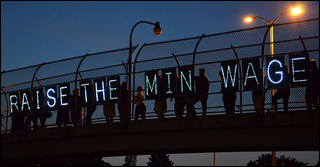Course Description
This is a graduate course in labor economics. The course will focus on covering theory and evidence on inequality, wage structure, skill demands, employment, job loss, and early-life determinants of long-run outcomes. Particular areas of focus are: (1) wage determination, including the Roy model, equalizing wage …
This is a graduate course in labor economics. The course will focus on covering theory and evidence on inequality, wage structure, skill demands, employment, job loss, and early-life determinants of long-run outcomes. Particular areas of focus are: (1) wage determination, including the Roy model, equalizing wage differentials, and models of discrimination; (2) the roles played by supply, demand, institutions, technology and trade in the evolving distribution of income.
Course Info
Instructors
Departments
Learning Resource Types
notes
Lecture Notes
assignment
Problem Sets

Protesters from Wisconsin Jobs Now and Occupy Riverwest raise awareness about the need to increase the state’s minimum wage. (Image by Wisconsin Jobs Now on Flickr. CC BY-NC.)










